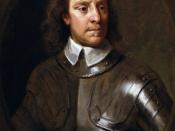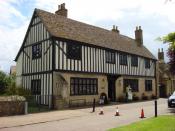Poet and political activist John Milton after a period of radical political revolution, religious turmoil, and his near execution; published the twelve book edition of Paradise Lost, a poem describing the biblical text of Genesis filled with hidden political meaning. Paradise Lost enraged those who supported the restoration of Charles II, was praised by seekers of religious toleration, and attacked by the Anglican Church. Critics denounced Paradise Lost for its construction, subject, and political meaning.
England in the seventeenth century was a land of political instability and religious persecution. Dissention among the British people began during the reign of the Stuart, Charles I (1629-1640). Charles I along with kings in France, Spain, and Germany created absolute monarchies (Cheyney 419). Charles I in 1629 dissolved Parliament, and ruled 11 years without Parliament. Charles I was a member of the Anglican Church, and didn't sympathize with various sects of Christianity that were persecuted by Anglicans (Cheyney 419).
These sects included Puritans, Quakers, Scottish Presbyterians, and Catholics. In response to Charles' religious intoleration Scottish Presbyterians threatened the English border, Irish Catholics rebelled, and Oliver Cromwell's Calvary attacked the Royalist army. Cromwell and the Scotch defeated the Royalists at Marstoon Moor on July 2, 1644 (Cheyney 434-444). Parliament took control of the new English Commonwealth in 1649, resulting in the beheading of Charles I (Halliday 118).
The English Commonwealth however was short lived. In 1653 Oliver Cromwell, took control of the Commonwealth. Cromwell dissolved the Rump Parliament (Parliament that took over after Charles I), taxed Royalists, imprisoned mutineers, crushed Irish rebels, routed Scottish rebels at Dunbar and Worcester, secured colonies in the Caribbean such as Jamaica, and defeated the Dutch regaining British naval superiority (Halliday 120-122). Cromwell died in 1658 leaving the control of England to rival generals. During Cromwell's military rule however,


